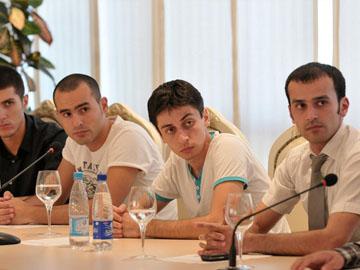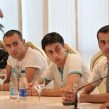
Azerbaijan Targets the Human Resource Problem
Publication: Eurasia Daily Monitor Volume: 8 Issue: 57
By:

On March 10-11, a large forum of Azerbaijani students studying in foreign countries took place in the French city of Strasbourg (www.1news.az). The event was sponsored by the Azeri Ministry of Youth and Sports and organized by the newly established NGO: ASAIF (Azerbaijani Students and Alumni International Forum). More than 200 young Azerbaijanis from 25 countries attended the event, most of them studying in Europe with the help of a presidential scholarship to study abroad. The event also featured a dozen high ranking members of the government of Azerbaijan, including the Minister of Youth and Sports, Deputy Minister of Education, Head of Department at the Presidential Administration, Head of the State Oil Fund, Chairman of the Parliament’s Foreign Relations Committee, several Azerbaijani ambassadors in European countries and others (www.day.az, March 12).
The high level attention to this forum by government officials can be explained in several ways. Foremost, the country is in dire need of a well-educated cadre. As the economy of Azerbaijan is growing fast and the country continues integrating into the global economy, the private sector as well as public organizations desperately search for young talent to employ. Although many reforms have been undertaken in the field of education in the past decade, including the construction of some 1,200 new secondary schools and several universities, still this sector lags behind and cannot meet the demands of the market. Some specialties are poorly trained, and others are not trained at all. Demand for public managers, finance specialists, MBA graduates, auditors, accountants, engineers, doctors and IT specialists is high in Azerbaijan (www.day.az, March 12).
In order to address this urgent problem, in 2007 President Ilham Aliyev signed a state program for studying abroad. More than 5,000 Azerbaijani students are expected to be sent abroad until 2015 under this program. Their educational as well as living expenses are fully covered by the program. According to the Deputy Minister of Education, Elmar Gasimov, who spoke at the forum, some 1,000 students have already benefitted from this unique opportunity.
It is evident that the Strasbourg forum was aimed at monitoring the progress of these students, providing an opportunity for them to network, meet each other, building friendship and partnership links. At the same time, it provided an opportunity for students to meet government officials, ask questions, raise concerns and listen to the government’s plans. In turn, government officials also gained an important opportunity to listen to the students. One official, the Head of the Civil Service Commission, Bahram Khalilov, announced that students studying abroad under the presidential scholarship would be employed in Azerbaijan without civil service exams. Shahmar Movsumov, the executive director of the State Oil Fund, which finances this program, urged the finance major students to apply to him for jobs (www.day.az, March 12).
The forum seemed to also have another goal: the unification of talented, western educated Azerbaijani youth for the better promotion of Azerbaijan, its national interests and foreign policy. The program of the forum featured panels on Public Diplomacy, New Ways to Promote Azerbaijan, Networking, Development Priorities of Azerbaijan and Unity for the Sake of Future. Participants in the event were urged to unite in order to effectively promote Azerbaijan in foreign countries, countering Armenian informational campaigns against Azerbaijan and tackling the Karabakh issue in light of the growing strength of the Armenian lobby (www.1news.az). In this respect, the forum seemed very timely and well-planned, smoothly fitting into the foreign policy agenda of the country. It is noteworthy that the government does not require the students to return to the country upon the completion of their studies, thus stressing that their post-study activity abroad within Azerbaijani diaspora is equally important.
ASAIF, as an organization, announced further steps towards consolidating Azerbaijani students studying abroad. The official website of the organization proclaimed, “ASAIF will increase its role as a bridge between Azerbaijani society and Azerbaijani youth abroad throughout the establishment of diaspora and lobbying activities for those students. There is a unique opening for Azerbaijan to enrich the image of the country abroad through educated youth. For that reason ASAIF will support variety of events organized by students abroad with different promotional packages” (www.asaif.org).
Meetings with Azerbaijani students abroad also occurred in December 2010 in Paris and London. Azerbaijan’s government seems determined to focus on this group and utilize their skills for the further development of the country. Driven solely by energy projects, Azerbaijan’s economic progress cannot be sustained until it develops its important human resource base.




